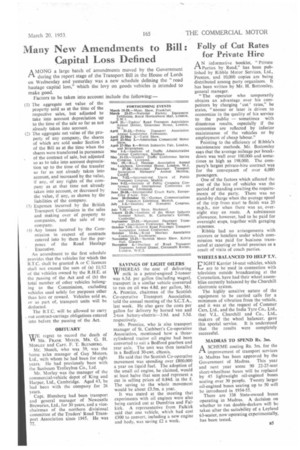Many New Amendments to Bill : Capital Loss Defined
Page 39

If you've noticed an error in this article please click here to report it so we can fix it.
A MONG a large batch of amendments moved by the Government ri during the report stage of the Transport Bill in the House of Lords on Wednesday and yesteiday was a new schedule defining the "road haulage capital loss," which the levy on goods vehicles is intended to make good.
Factors to be taken into account include the following:— (I) The aggregate net value of the property sold as at the time of the respective sales, but adjusted to take into account depreciation up to the time of the sale so far as not already taken into account.
(2) The aggregate net value of the property of any company, the shares of which are sold under Section 5 of the Bill as at the time when the shares were transferred in pursuance of the contract of sale, but adjusted so as to take into account depreciation up to the time of the transfer so far as not already taken into account, and increased by the value, if any, of any rights of the company as at that time not already taken into account, or decreased by the value, if any, as shown by the liabilities of the company.
(3) Expenses incurred by the British Transport Commission in the sales and making over of property to companies, and the sale of any company.
14) Any losses incurred. by the Commission in respect of contracts entered into by them for the purposes of the Road Haulage Executive.
An amendment to the first schedule provides that the vehicles for which the B.T.C. shall be granted A or C licences shall not exceed the sum of (a) 11/12 of the vehicles owned by the R.H.E. at the passing of the Act and of (b) the total number of other vehicles belonging to the Commission, excluding vehicles used solely for purposes other than hire or reward. Vehicles sold as, or as part of, transport units will be deducted.
The B.T.C. will be allowed to carry . out contract-carriage obligations entered into before the passing of the Act. SAVINGS OF LIGHT OILERS
WHEREAS the cost of delivering milk in a petrol-engined 2-tanner was 6.5d. per gallon (including wages), transport in a similar vehicle converted to run on oil was 4.8d. per gallon, Mr. A. Prentice, chairman of the Scottish Co-operative Transport Association, told the annual meeting of the S.C.T.A., last week. He also gave the costs per gallon for delivery by horsed van and 2-ton battery-electric-3.9d. and 5.5d. respectively.
Mr. Prentice, who is also transport manager of St. Cuthbert's Co-operative Association, mentioned how a 'threecylindered tractor oil engine had been converted to suit a Bedford gearbox and rear axle. The unit was then installed in a Bedford 30-cwt. chassis.
He said that the Scottish Co-operative movement was spending over £800,000 a year on liquid fuel. The adoption of the small oil engine, he claimed, would at !east halve that sum and represent a cut in selling prices of 0.84d. in the The saving to the whole movement would be about £3.5m. a year.
It was stated at the meeting that experiments with oil engines were also being carried out at Dumfries and Falkirk. A representative from Falkirk said that one vehicle, which had cost £300 to convert, including a new engine and body, was saving £2 a week.










































































































